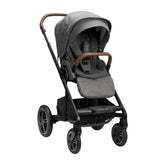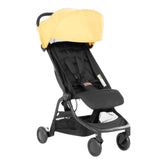What is Postpartum Depression? Symptoms, Causes, Treatment

Updated 19 Dec 2024
Giving birth is a life-altering experience. Regardless of how eager you may be to finally meet the sweet little baby you’ve been dreaming about, you’re also trying to navigate massively fluctuating hormones and very little sleep. It makes sense, then, that many women find the stage after childbirth pretty daunting and experience a spell of the “baby blues.” For about one in eight moms, however, those feelings worsen into postpartum depression (PPD). Fortunately, postpartum depression is a treatable condition. Let’s talk about what every parent who’s just given birth needs to know about postpartum depression.
What Is Postpartum Depression?
Postpartum, sometimes referred to as peripartum depression, is a medical condition that occurs following childbirth. While not uncommon, it can be serious, causing those who suffer to feel sad, empty, and numb. It can also cause fatigue, mood changes, and overall feelings of despair in the weeks and months following delivery. The good news is that if you’re suffering from these symptoms, you’re not alone, it’s not your fault, and treatment is available
What Are the Symptoms of Postpartum Depression?
The baby blues are quite common after delivery. Most people experience varying degrees of exhaustion, moodiness, and sadness due to the roller coaster of hormones and lack of sleep. Postpartum depression, however, lasts for weeks following childbirth and can be severe enough that it inhibits your ability to function properly.
Symptoms vary and may even change from day to day. They typically begin less than a month after delivery. Notably, it can cause many women to feel detached from their newborns. These feelings are not your fault. Other symptoms of postpartum depression may include:
- feelings of guilt or worthlessness
- feeling overwhelmed
- sadness
- crying
- anxiety
- eating too much or having no appetite at all
- sleeping too much or the inability to sleep at all
- lack of motivation or energy
- lack of interest in the baby
- thoughts of self-harm or of hurting the baby
- frequent pains, aches, or stomach troubles
Experiencing these symptoms doesn’t make you a bad parent. It does mean, however, that you need medical attention and should speak to your healthcare provider to receive treatment to feel better.

What Causes Postpartum Depression?
Postpartum depression can be caused by a variety of physical transformations and emotional triggers.
Physical Changes
The sudden drop in hormone levels after childbirth may contribute to the onset of postpartum depression, along with several other physical stressors:
- lack of sleep
- hypothyroidism
- drug and alcohol use
- other medical issues
Emotional Triggers
Experiencing stressful life events during pregnancy can also greatly affect the possibility of having postpartum depression. Emotional triggers may include:
- monetary stress
- the breakup of a relationship
- the death of a friend or family member
How Is Postpartum Depression Diagnosed?
If you experience symptoms of PPD for more than two weeks within the first 12 months following childbirth, you should ask your healthcare provider for a screening. Typically, they’ll ask you about the types of symptoms you’re experiencing, changes in your sleeping patterns, feelings of fatigue or depleted energy levels, and feelings of irritability. They may also inquire whether you’ve recently experienced any other traumatic or stressful events, whether you have a history of depression, and what types of medications you’ve used. In addition, you may be screened for thyroid disease or nutrient deficiencies that could be aggravating your depressive symptoms.

What Are Treatment Options for Postpartum Depression?
Postpartum depression is treated in several ways, including therapy, drugs, and support groups. Usually, medication in conjunction with therapy is considered a first-line treatment for women with mild to moderate symptoms of PPD.
Medications
Antidepressants are the most commonly used drug for postpartum depression treatment. These medications help to balance the chemicals in your brain that control your mood and are effective at relieving PPD symptoms. That said, they take time to work – usually about six to eight weeks. Antidepressants also have varying degrees of side effects, including digestive issues, headaches, and anxiety. You may need to try different drugs before landing on the one that works best for you.
- Selective serotonin reuptake inhibitors (SSRIs). These are commonly prescribed and normally have fewer side effects than other antidepressants. Examples include paroxetine (Paxil), fluoxetine (Prozac), and sertraline (Zoloft).
- Atypical antidepressants. These may relieve PPD that’s not helped by SSRIs. Atypical antidepressants affect several neurotransmitters in the brain that control mood. Examples include bupropion (Wellbutrin), trazodone (Desyrel), and nefazodone (Serzone).
- Tricyclic antidepressants and monoamine oxidase inhibitors. Less commonly prescribed, these are older types of antidepressants that are effective for some people.
- Brexanolone: Brexanolone (Zulresso) is administered intravenously by a healthcare professional over 60 hours. This medication is typically reserved for patients who have been unresponsive to other types of medication.
Fortunately for breastfeeding parents, most of these medications are safe to use, since very little passes through to the milk. It’s also worth noting that taking medication doesn’t mean you’ll have to stay on it forever. Postpartum depression usually resolves within six months to a year (though some people do require longer treatment). Always consult your healthcare provider before discontinuing any medication.
Hormone therapy
There is a significant dip in progesterone and estrogen levels after childbirth. Some experts believe this dramatic shift may contribute to the onset of postpartum depression and that hormone therapy may be another effective way to manage symptoms.
Cognitive behavioral therapy (CBT)
Cognitive behavioral therapy (CBT) involves learning new strategies and techniques to manage your mindset, solve problems, re-examine your thinking patterns, identify distortions in thinking, and instill confidence in your own abilities. Research has shown that the addition of CBT minimizes the symptoms more effectively than other types of medication and therapy alone.
Natural remedies
Regular, moderate exercise, healthy eating, and time outdoors may also assist in recovery when used in conjunction with medication and therapy. Keep in mind, however, that postpartum depression is a serious and taxing medical condition that should not be left untreated. PPD requires professional medical intervention.

How Can You Prevent Postpartum Depression?
PPD is quite common and not necessarily preventable. However, recognizing the symptoms may help you identify the condition and get treatment quickly if you need it. Some research indicates that specific interventions, like taking antidepressants during and immediately after pregnancy, could lower your risk of developing severe postpartum depression. Further, partaking in therapy sessions during and after pregnancy may also lower the risk of PPD for those with an elevated risk of developing it.
Other strategies that may help lower your chances of developing postpartum depression include:
- getting plenty of rest
- avoiding alcohol
- eating a balanced nutritious diet and engaging in regular moderate exercise
- spending time outdoors
- taking childbirth and baby care classes
- having a strong support network of family and friends before childbirth
The Takeaway on Postpartum Depression
Postpartum depression is a common but serious condition and can occur quickly after pregnancy. If you or your loved one is experiencing symptoms, understand that it's no one's fault. Talking with a physician or mental healthcare provider can help. If someone is showing signs of delusions or hallucinations postpartum, seek medical attention immediately. The Postpartum Support International hotline is available any time of day by calling 1-800-944-4773 (4PPD). Talk to someone – a little extra help can go a long way toward healing.









